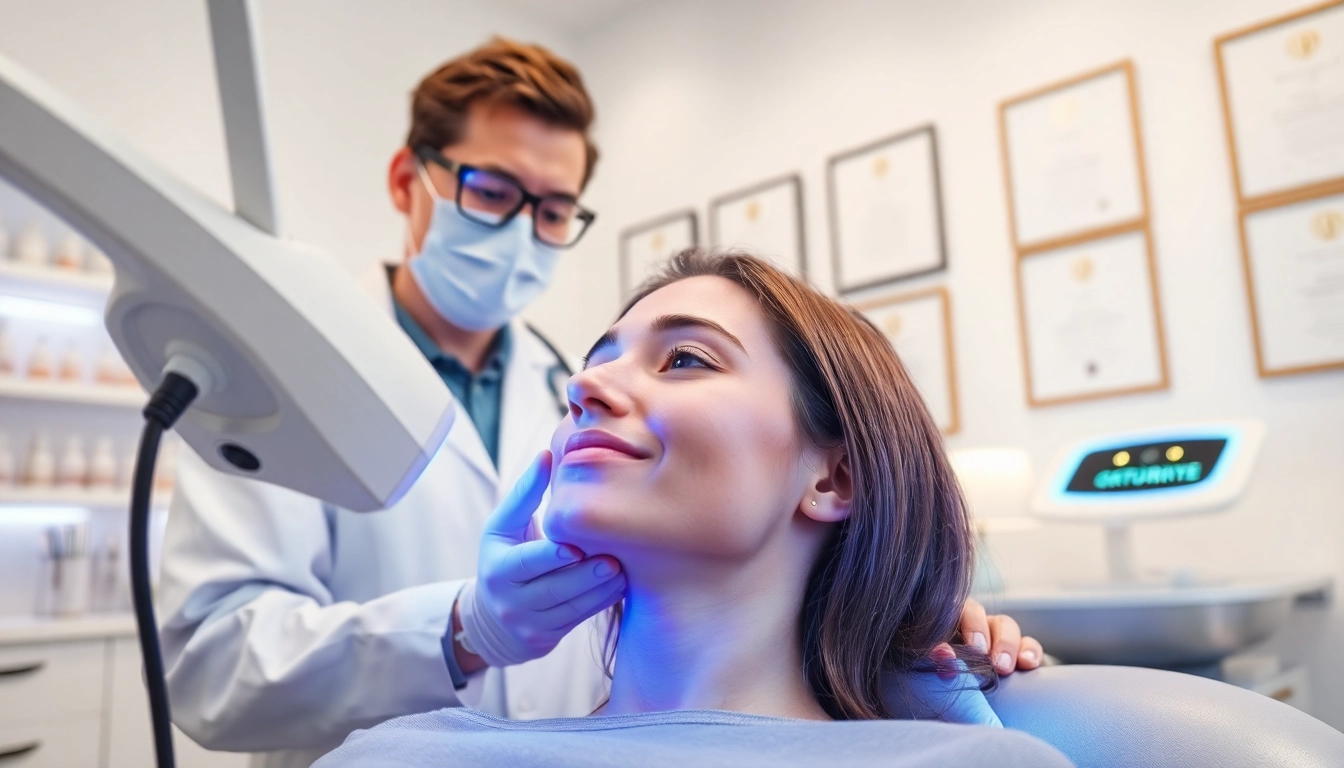Introduction to Acne Treatment
Acne is one of the most common skin conditions, affecting millions of individuals across different age groups. Understanding the complexities of acne and its treatment options is essential for anyone dealing with this condition. From adolescents to adults, acne can have a significant impact on self-esteem and quality of life. It is crucial to explore a wide array of treatment options to find an effective solution. This comprehensive guide on Acne Treatment will walk you through everything from the types of acne and their causes to treatment methods and preventative care strategies.
Defining Acne and Its Types
Acne is characterized by various skin lesions, commonly manifesting as pimples, blackheads, and cysts. There are several types of acne, including:
- Comedonal Acne: Comedones are non-inflammatory lesions that include blackheads and whiteheads. They develop when hair follicles become clogged with oil and dead skin cells.
- Inflammatory Acne: This type includes papules and pustules and indicates an inflammatory response to clogged pores. Inflammatory acne is more severe and often requires more intensive treatment.
- Cystic Acne: The most severe form of acne, cystic acne involves painful, inflamed cysts under the skin. It often requires prescription medications to manage.
Recognizing the type of acne is essential for determining the most effective treatment strategy.
The Importance of Early Intervention in Acne Treatment
Early intervention plays a crucial role in reducing the severity and lifespan of acne. Delaying treatment can lead to worsening conditions and potential scarring. Initiating a straightforward treatment plan as soon as acne is noticed helps mitigate further skin damage and enhances the chances of achieving clear skin. Consulting with a dermatologist for early diagnosis and personalized treatment recommendations can significantly improve outcomes.
Differentiating Mild, Moderate, and Severe Acne
Acne severity varies among individuals, and understanding these differences is paramount for effective treatment:
- Mild Acne: Characterized by minimal breakouts, including a few comedones and maybe occasional pimples.
- Moderate Acne: Involves more frequent breakouts, including multiple comedones and inflamed lesions.
- Severe Acne: Features extensive lesions, including cysts and nodular formations, often requiring aggressive treatment strategies.
Recognizing which category your acne falls into will guide your treatment plan and set realistic expectations for recovery.
Understanding Acne Causes and Triggers
The Role of Hormones in Acne Treatment
Hormonal fluctuations are a primary trigger for acne, particularly during puberty, menstruation, and hormonal imbalances. Androgens, male hormones present in both sexes, stimulate the sebaceous glands to produce excess oil, leading to clogged pores. Understanding one’s hormonal landscape can help determine the most effective treatment approach. Treatments that target hormonal imbalances, including hormonal therapies, can significantly improve acne in women, especially during their menstrual cycles.
Dietary Influences on Acne Formation
Recent studies indicate that diet may influence acne severity. Some key dietary considerations include:
- High Glycemic Index Foods: Foods that spike insulin levels, such as sugary snacks and white bread, may worsen acne.
- Dairy Products: Research suggests a link between milk consumption and increased acne prevalence. Opting for non-dairy alternatives may benefit some individuals.
- Omega-3 Fatty Acids: Consuming foods rich in omega-3s, like fish oil, can help reduce inflammation associated with acne.
Maintaining a balanced diet rich in antioxidants and low in processed foods can aid in acne prevention.
Environmental Factors Affecting Skin Health
Environmental factors significantly contribute to acne development. These include pollution, humidity, and sun exposure. Pollution can lead to clogged pores and increase skin inflammation. As such, maintaining a proper skincare regimen, including daily washing and exfoliation, can help mitigate these effects. Additionally, wearing non-comedogenic makeup can help protect the skin from environmental triggers.
Topical Treatments and Their Efficacy
Common Ingredients in Acne Treatment Products
Understanding the key ingredients in acne treatments can guide effective choices:
- Benzoyl Peroxide: A potent antibacterial agent that reduces acne-causing bacteria. It is effective for mild to moderate inflammatory acne.
- Salicylic Acid: A beta hydroxy acid that helps exfoliate the skin and unclog pores. It is especially effective for treating comedonal acne.
- Retinoids: Vitamin A derivatives that promote skin cell turnover, making them ideal for mild to moderate acne.
Each of these ingredients targets acne differently, and understanding their functions can optimize treatment effectiveness.
Guidelines for Proper Application of Topical Treatments
Proper application techniques enhance the efficacy of topical treatments:
- Start with a clean, dry face.
- Use a pea-sized amount of treatment and apply it directly to affected areas.
- Consistently apply treatments as directed, typically once to twice daily.
Regular adherence to these guidelines can significantly improve treatment outcomes.
Understanding Combination Therapies for Best Results
Combination therapies involving multiple active ingredients can enhance treatment effectiveness, providing a multifaceted approach to acne management. For instance, pairing a retinoid with benzoyl peroxide allows for improved inflammation reduction and pore-clearing action. It is essential, however, to introduce combination therapies gradually, allowing the skin to adjust without excessive irritation.
Professional Treatments for Acne Management
The Benefits of Laser Therapy in Acne Treatment
Innovative treatments such as laser therapy have emerged as effective solutions for managing acne and its scars. Laser treatments target the deeper layers of skin to stimulate collagen production and support healing. They can significantly improve skin texture and tone. Consulting with a dermatologist to assess candidacy and expected results can provide deeper insight into this option.
Chemical Peels vs. Microdermabrasion: What’s Right for You?
Chemical peels involve applying a solution to the skin, promoting exfoliation and deep cleaning of clogged pores. They are effective in treating moderate to severe acne. Microdermabrasion, on the other hand, involves physically exfoliating the skin’s surface. While both treatments can improve skin appearance, the best choice depends on acne severity and skin type. A consultation with a skincare professional can help tailor the choice to your individual needs.
When to Consider Prescription Medications for Acne Treatment
For individuals with moderate to severe acne, over-the-counter options may not suffice. Prescription medications, such as oral antibiotics and isotretinoin, are sometimes necessary. These can drastically improve severe acne by addressing underlying factors. However, they often come with potential side effects, so monitoring by a healthcare professional is essential.
Maintaining Clear Skin After Treatment
Long-Term Skincare Routines for Acne Prevention
Establishing an effective long-term skincare routine is crucial for maintaining clear skin after treating acne. This includes:
- Gentle cleansing twice daily to remove excess oil and impurities.
- Incorporating non-comedogenic moisturizers to maintain skin hydration without clogging pores.
- Regular use of sunscreen to protect against UV damage and prevent hyperpigmentation post-acne.
Consistency in these practices will contribute to long-term skin health and prevent future outbreaks.
Regular Dermatological Check-Ups: Why They Matter
Regular visits to a dermatologist ensure ongoing evaluation of acne treatment effectiveness and skin health. Dermatologists can provide valuable insights into the latest emerging treatments, suggest modifications for your current regimen, and quickly address any complications. Having a professional’s guidance can optimize treatment outcomes and skin wellness.
Overcoming Psychological Barriers Associated with Acne
Beyond physical symptoms, acne can lead to psychological challenges, including anxiety and depression. Addressing these concerns with a mental health professional, in addition to pursuing physical treatment, is essential for overall well-being. Support from friends, family, or support groups can also greatly aid in overcoming challenges associated with acne’s emotional impact.
In conclusion, managing acne effectively requires a holistic approach that encompasses the understanding of types, causes, and numerous treatment options. Personalized treatment plans and supportive routines can lead to successful outcomes. Ultimately, anyone grappling with acne should remember that improvement is not just possible; it is achievable through informed action and self-care.


